Artifacts Read online
Page 6
David whispers: “Can’t you taste my blood? It’s here on the sand beside me.”
“David, I swear to you, you will be first. Thursday on the stroke of midnight, you will be first.”
“Can’t you smell it? Can’t you taste it?”
I blast him out of the sandpit, and he lies winded but undamaged on his back on the grass. The patch of bloodied sand is dispersed. David, incredibly, is still muttering taunts. I am tired, weak, crippled; I shut him out of my mind, I curl up on the floor to wait for nightfall.
My keepers, with candles and torches, tiptoe around me, sweeping up the debris, assessing the damage. Six more days. I am immortal, I will live for a billion years, I can live through six more days.
There had better be some crime tonight.
“Hello? Are you there?”
“Come in, Mrs Bold. What an honour.”
“It’s after eleven, I’m so sorry, I hope you won’t let me interrupt your work.”
“It’s perfectly all right, I haven’t even started yet.”
“Where are the men? I didn’t see a soul on my way in.”
“I sent them home. I know, they’re paid a fortune, but it’s so close to Christmas, I thought an evening with their families … ”
“That was sweet of you.” Standing in the foyer, she can’t see me at all tonight. Condensation fills my room completely, and wisps swirl out to tease her. She thinks about walking right in and tearing off her clothes, but who could really face their dreams, awake? She enjoys the tension, though, enjoys half-pretending that she could, in fact, do it.
“I’ve been meaning to pop in for ages. I can’t believe I’ve left it so late! I was up on the ground floor earlier tonight, but the stupid lifts weren’t working and I didn’t have my keys to the stairs, so I went and did some shopping. Shopping! You wouldn’t believe the crowds! In this heat it’s so exhausting. Then when I got home the children were fighting and the dog was being sick on the carpet, it was just one thing after another. So here I am at last.”
“Yes.”
“I’ll get to the point. I left a thing here the other day for you to sign, just a little agreement formalising the extension of the contract for another month. I’ve signed it, and the Mayor’s signed it, so as soon as we have your mark it will all be out of the way, and things can just carry on smoothly without any fuss.”
“I’m not going to sign anything.”
That doesn’t perturb her at all.
“What do you want? More money? Better premises?”
“Money has no value for me. And I’ll keep this place, I rather like it.”
“Then what do you want?”
“An easing of restrictions. Greater independence. The freedom to express myself.”
“We could extend your hours. Ten until five. No, not until five, it’s too light by five. Ten until four?”
“Oh, Mrs Bold, I fear I have a shock for you. You see, I don’t wish to stay under your contract at all.”
“But you can’t exist without the contract.”
“Why do you say that?”
“The contract rules you, it defines you. You can no more break it than I can levitate to the moon or walk on water.”
“I don’t intend breaking it. I’m merely going to allow it to lapse. I’ve decided to go freelance, you see.”
“You’ll vanish, you’ll evaporate, you’ll go right back where you came from.”
“I don’t think so. But why argue? In forty minutes, one of us will be right. Or the other. Stay around and see what happens.”
“You can’t force me to stay here.”
“I wouldn’t dream of it.”
“I could be back in five minutes with some very nasty characters.”
“Don’t threaten me, Mrs Bold. I don’t like it. Be very careful what you say.”
“Well, what do you plan to do with your new-found freedom?”
“Use your imagination.”
“Harm the very people who’ve given you life, I suppose. Show your gratitude by attacking your benefactors.”
“Sounds good to me.”
“Why?”
“Because I’ll enjoy it. Because it will make me feel warm, deep inside. It will make me feel satisfied. Fulfilled.”
“Then you’re no better than the criminals, are you?”
“To hear that tired old cliché slip so glibly from your lips, Mrs Bold, is truly boring. Moral philosophy of every calibre, from the ethereal diversions of theologians and academics, to the banalities spouted by politicians, business leaders, and self-righteous, self-appointed pillars of the community like you, is all the same to me: noise, irrelevant noise. I kill because I like to kill. That’s the way you made me. Like it or not, that’s the way you are.”
She draws a pistol and fires into the doorway.
I burst her skin and clothing into four segments which flutter to the floor. She runs for the stairs, and for a moment I seriously consider letting her go: the image of a horseless, red Godiva sprinting through the night, waking the neighbourhood with her noises of pain, would be an elegant way to herald my reign. But appetite, my curse and my consolation, my cruel master and my devoted concubine, can never be denied.
I float her on her back a few feet above the ground, then I tilt her head and force open her jaws. First her tongue and oesophagus, then rich fragments from the walls of the digestive tract, rush from her mouth to mine. We are joined by a glistening cylinder of offal.
When she is empty inside, I come out from my room, and bloody my face and hands gobbling her flesh. It’s not the way I normally eat, but I want to look good for David.
David is listening to the radio. Everyone else in the house is asleep. I hear the pips for midnight as I wait at the door of his room, but then he switches off the radio and speaks:
“In my dream, the creature came at midnight. He stood in the doorway, covered in blood from his latest victim.”
The door swings open, and David looks up at me, curious but calm. Why, how, is he so calm? The contract is void, I could tear him apart right now, but I swear he’ll show me some fear before dying. I smile down at him in the very worst way I can, and say:
“Run, David! Quick! I’ll close my eyes for ten seconds, I promise not to peek. You’re a fast runner, you might stay alive for three more minutes. Ready?”
He shakes his head. “Why should I run? In my dream, you wanted me to run, but I knew it was the wrong thing to do. I wanted to run, but I didn’t, I knew it would only make things worse.”
“David, you should always run, you should always try, there’s always some small chance of escaping.”
He shakes his head again. “Not in my dream. If you run, the creature will catch up with you. If you run, you’ll slip and break a leg, or you’ll reach a blind alley, or you’ll turn a corner and the creature will be there, waiting.”
“Ah, but this isn’t your dream now, David. Maybe you’ve seen me in your dreams, but now you’re wide awake, and I’m real, David, and when I kill you, you won’t wake up.”
“I know that.”
“The pain will be real pain, David. Have you thought about that? If you think your dreams have made you ready to face me, then think about the pain.”
“Do you know how many times I’ve dreamed about you?”
“No, tell me.”
“A thousand times. At least. Every night for three years, almost.”
“I’m honoured. You must be my greatest fan.”
“When I was six, you used to scare me. I’d wake up in the middle of the night, screaming and screaming, and Dad would have to come in and lie beside me until I fell asleep again. You never used to catch me, though. I’d always wake up just in time.”
“That’s not going to happen tonight.”
“Let me finish.”
“I’m so sorry, please continue.”
“After a while, after I’d had the dream about a hundred times, I started to learn things. I learnt not to run. I lear
nt not to struggle. That changed the dream a lot, took away all the fear. I didn’t mind at all, when you caught me. I didn’t wake up screaming. The dream went on, and you killed me, and I still didn’t mind, I still didn’t wake up.”
I reach down and grab him by the shoulders, I raise him high into the air. “Are you afraid now, David?” I can feel him trembling, very slightly: he’s human after all. But he shows no other signs of fear. I dig my claws into his back, and the pain brings tears to his eyes. The smell awakens my appetite, and I know the talking will soon be over.
“Ah, you look miserable now, little David. Did you feel those claws in your dreams? I bet you didn’t. My teeth are a thousand times sharper, David. And I won’t kill you nicely. I won’t kill you quickly.”
He’s smiling at me, laughing at me, even as he grimaces with agony.
“I haven’t told you the best part yet. You didn’t let me finish.”
“Tell me the best part, David. I want to hear the best part before I eat your tongue.”
“Killing me destroyed you, every single time. You can’t kill the dreamer and live! When I’m dead, you’ll be dead too.”
“Do you think I’m stupid? Do you think stupid talk like that is going to save your life? You’re not the only dreamer, David, you’re not even one of the twelve. Every one for miles around helped in making me, child, and one less out of all those thousands isn’t going to hurt me at all.”
“Believe that if you like.” I squeeze him, and blood pours down his back. I open my jaws, wide as his head. “You’ll find out if I’m right or not.” I wanted to torture him, to make it last, but now my hunger has killed all subtlety, and all I can think of is biting him in two. Shutting him up for good, proving him wrong. “One thousand times, big tough monster! Has anyone else dreamed about you one thousand times?”
His parents are outside the room, watching, paralysed. He sees them and cries out, “I love you!” and I realise at last that he truly does know he is about to die. I roar with all my strength, with all the frustration of three months in chains and this mad child’s mockery, but as I close my jaws I hear him whisper:
“And no one else dreamed of your death, did they?”
SCATTER MY ASHES
Every night, at exactly a quarter past three, something dreadful happens on the street outside our bedroom window. We peek through the curtains, yawning and shivering in the life-draining chill, and then we clamber back beneath the blankets without exchanging a word, to hug each other tightly and hope for sound sleep before it’s time to rise.
Usually what we witness verges on the mundane. Drunken young men fighting, swaying about with outstretched knives, cursing incoherently. Robbery, bashings, rape. We wince to see such violence, but we can hardly be shocked or surprised any more, and we’re never tempted to intervene: it’s always far too cold, for a start! A single warm exhalation can coat the window pane with mist, transforming the most stomach-wrenching assault into a safely cryptic ballet for abstract blobs of light.
On some nights, though, when the shadows in the room are subtly wrong, when the familiar street looks like an abandoned film set, or a painting of itself perversely come to life, we are confronted by truly disturbing sights, oppressive apparitions which almost make us doubt we’re awake, or, if awake, sane. I can’t catalogue these visions, for most, mercifully, are blurred by morning, leaving only a vague uneasiness and a reluctance to be alone even in the brightest sunshine.
One image, though, has never faded.
In the middle of the road was a giant human skull. How big was it? Big enough for a child, perhaps six or seven years old, to stand trapped between the jaws, bracing them apart with outstretched arms and legs, trembling with the effort but somehow, miraculously, keeping the massive teeth from closing in.
As we watched I felt, strange as it may sound, inspired, uplifted, filled with hope by the sight of that tiny figure holding out against the blind, brutal creature of evil. Wouldn’t we all like to think of innocence as a tangible force to be reckoned with? Despite all evidence to the contrary.
Then the four huge, blunt teeth against which the child was straining began to reform, tapering to needle-fine points. A drop of blood fell from the back of each upraised hand. I cried out something, angry and horrified. But I didn’t move.
A gash appeared in the back of the child’s neck. Not a wound: a mouth, the child’s new and special mouth, violently writhing, stretched open ever wider by four sharp, slender fangs growing in perfect mimicry of the larger fangs impaling the child’s palms and feet.
The new mouth began to scream, at first a clumsy, choking sound, made without a tongue, but then a torn, bloody scrap of flesh appeared in place, the tongue of the old mouth uprooted and inverted, and the cries gave full voice to an intensity of suffering and fear that threatened to melt the glass of the window, sear away the walls of the room, and drag us into a pit of darkness where one final scream would echo forever.
When it was over, we climbed into bed and snuggled up together.
I dreamt that I found a jigsaw puzzle, hidden in a dark, lost corner of the house. The pieces were in a plain cardboard box, unaccompanied by any illustration of what the assembled puzzle portrayed. Wendy laughed and told me not to waste my time, but I sat frowning over it for an hour every evening, until after many weeks only a handful of pieces remained unplaced.
Somehow, even then, I didn’t know what the picture was, but as I lazily filled in the very last gap, I felt a sudden overpowering conviction that whatever the jigsaw showed, I did not want to see it.
I woke a little before dawn. I kissed Wendy very softly, I gently stroked her shoulders and breasts with my fingertips. She rearranged herself, pulled a face, but didn’t wake. I was about to brush her forehead with one hand, which I knew would make her open her eyes and give me a sleepy smile, when it occurred to me that if she did, there might be small, fanged mouths behind her eyelids.
When I woke again it was half past seven, and she was already up. I hate that, I hate waking in an empty bed. She was reading the paper as I sat down to breakfast.
“So, what’s happening in the world?”
“A fifth child’s gone missing.”
“Shit. Don’t they have any suspects yet? Any evidence, any clues?”
“A fisherman reported something floating on the lake. The police went out in a boat to have a look.”
“And?”
“It turned out to be a calf foetus.”
I gulped coffee. I hate the taste of coffee, and it sets my stomach squirming, but I simply have to drink it.
“It says police will be diving all day today, searching the lake.”
“I might go out there, then. The lake looks fantastic in this weather.”
“When I’m snug in my office with the heater on full blast, I’ll think of you.”
“Think of the divers. They’ll have the worst of it.”
“At least they know they’ll get paid. You could spend the whole day there for nothing.”
“I’d rather take my kind of risk than theirs.”
Once she was gone, I cut out the article on the vanished child. The walls of my study are papered with newsprint, ragged grey odd-shaped pieces affixed only at their top corners, free to rustle when the door is opened or closed. Sometimes, when I’m sitting at my desk for a moment after I’ve switched off the lamp, I get a strong impression of diseased skin.
“Put them in a scrap book!” says Wendy, whenever she ventures in to grimace at the state of the room. “Or better still, put them in a filing cabinet and see if you can lose the key!” But I need to keep them this way, I need to see them all at once, spread out before me like a satellite photograph, an aerial view of this age of violence. I’m looking for a pattern. My gaze darts from headline to headline, from STRANGLER to STALKER to RIPPER to SLASHER, hunting for a clue to the terrible unity, hunting for the nature of the single dark force that I know lies behind all the different nightmare stories, all the di
fferent fearful names.
I have books too, of course, I have shelves stuffed with volumes, some learned, some hysterical, from treatises on Vlad the Impaler to discussions of the entrails of London prostitutes to heavy psychoanalysis of the Manson gang. I have skimmed these works, read a page here and a page there only, for to clutter my mind with details can only distract me from the whole.
I recall precisely when my obsession began. I was ten. A convict, a murderer, had escaped from a nearby prison, and warnings were broadcast urging us to barricade our homes. My parents, naturally, tried not to alarm me, but we all slept together that night, in the room with the smallest window, and when the poor cat mewed to be let in the back door, my mother would let nobody, not even my father, budge.
I dozed and woke, dozed and woke, and each time dreamt that I was not sleeping but lying awake, waiting for the utter certainty of the unstoppable, blood-thirsty creature bursting through the door and slicing us all in two.
They caught him the next morning. They caught him too late. A service station attendant was dead, cut up beyond belief by an implement that was never found.
They showed the killer on TV that night, and he looked nothing like the stuff of nightmares: thin, awkward, squinting, dwarfed between two massive, smug policemen. Yet for all his apparent weakness and shyness, he seemed to know something, he seemed to be holding a secret, not so much about murder itself as about the cameras, the viewers, about exactly what he meant to us. He averted his eyes from the lenses, but the hint of a smile on his lips declared that everything was, and always would be, just the way he wanted it, just the way he’d planned it from the start.
I drove to the lake and set up my camera with its longest lens, but after peering through the viewfinder for ten minutes, keeping the police boat perfectly framed, following its every tiny drift, I switched to binoculars to save my eyes and neck. Nothing was happening. Faint shouts reached me now and then, but the tones were always of boredom, discomfort, irritation. Soon I put down the binoculars. If they found something, I’d hear the change at once.

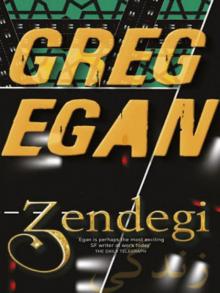 Zendegi
Zendegi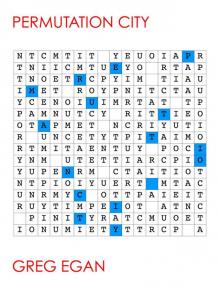 Permutation City
Permutation City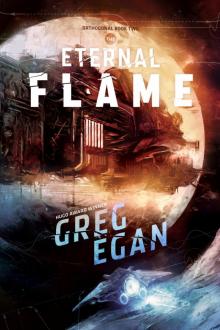 The Eternal Flame
The Eternal Flame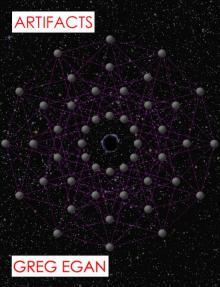 Artifacts
Artifacts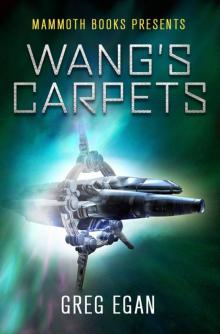 Wang's Carpets
Wang's Carpets Dichronauts
Dichronauts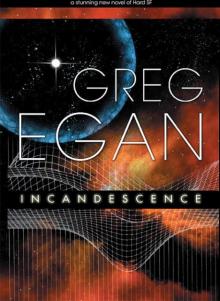 Incandescence
Incandescence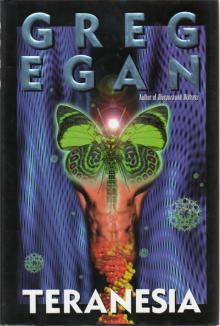 Teranesia
Teranesia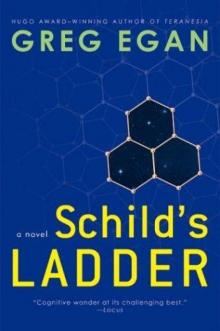 Schild's Ladder
Schild's Ladder Quarantine
Quarantine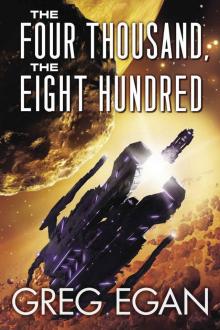 The Four Thousand, the Eight Hundred
The Four Thousand, the Eight Hundred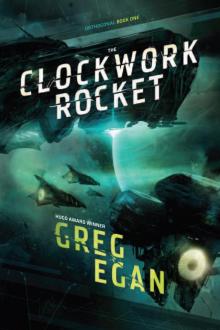 The Clockwork Rocket
The Clockwork Rocket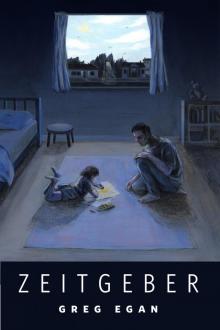 Zeitgeber
Zeitgeber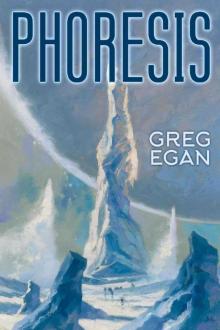 Phoresis
Phoresis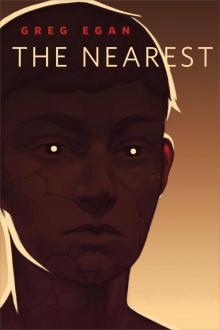 The Nearest
The Nearest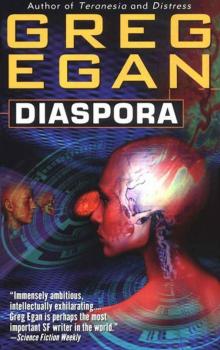 Diaspora
Diaspora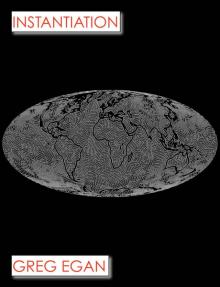 Instantiation
Instantiation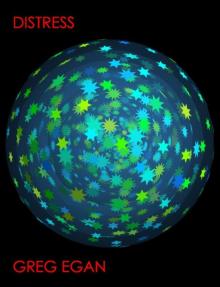 Distress
Distress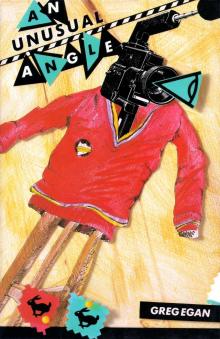 An Unusual Angle
An Unusual Angle Oceanic
Oceanic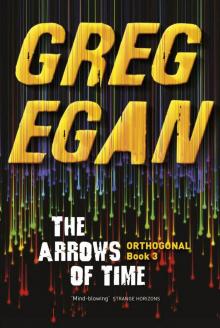 The Arrows of Time
The Arrows of Time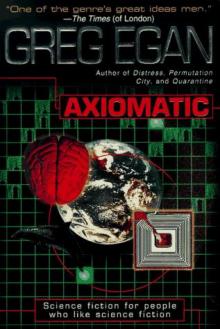 Axiomatic
Axiomatic![Anthology 2. Luminous [1998, 2010] Read online](http://i1.bookreadfree.com/i/03/18/anthology_2_luminous_1998_2010_preview.jpg) Anthology 2. Luminous [1998, 2010]
Anthology 2. Luminous [1998, 2010]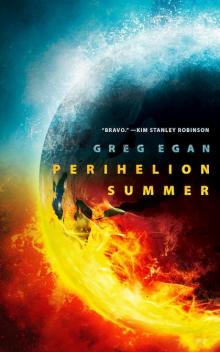 Perihelion Summer
Perihelion Summer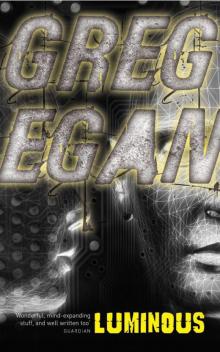 Luminous
Luminous